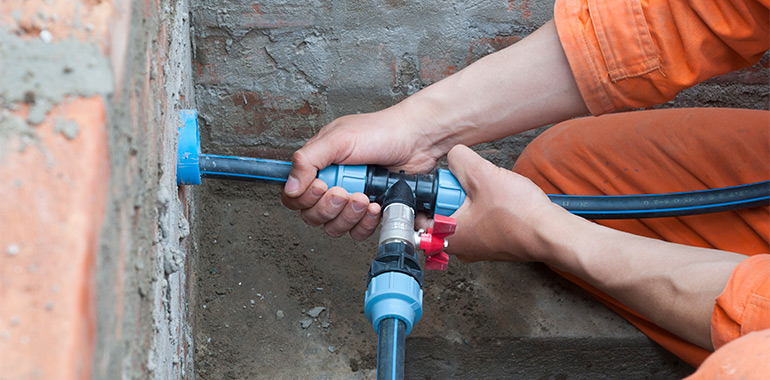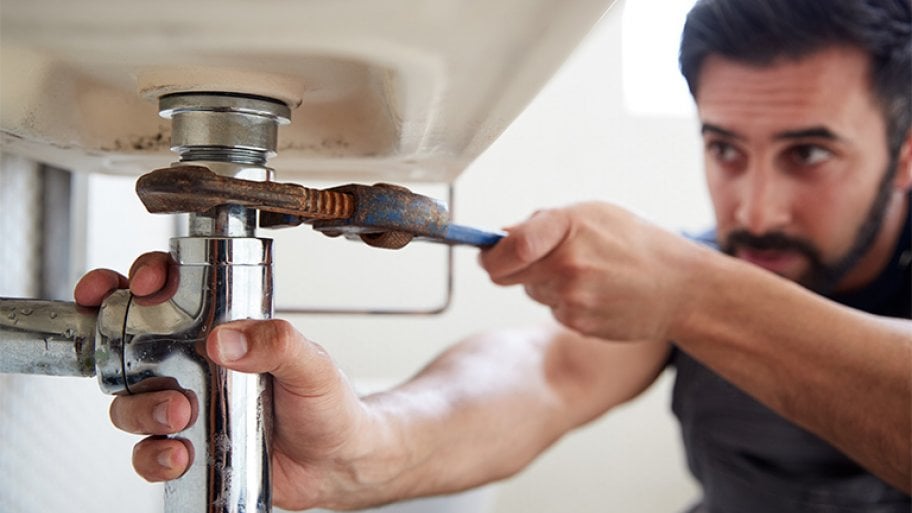Right here below you can locate a lot of extremely good ideas relating to How To Fix Noisy Pipes.

To diagnose noisy plumbing, it is important to identify initial whether the undesirable noises take place on the system's inlet side-in various other words, when water is turned on-or on the drain side. Sounds on the inlet side have varied reasons: too much water pressure, used valve and faucet parts, poorly connected pumps or various other home appliances, improperly placed pipe fasteners, and also plumbing runs containing way too many limited bends or other limitations. Noises on the drain side usually come from poor place or, just like some inlet side sound, a layout containing tight bends.
Hissing
Hissing noise that takes place when a faucet is opened slightly normally signals excessive water stress. Consult your local water company if you think this trouble; it will have the ability to inform you the water stress in your area and can mount a pressurereducing shutoff on the inbound water supply pipe if required.
Other Inlet Side Noises
Squeaking, squealing, scraping, snapping, and tapping typically are caused by the growth or contraction of pipelines, normally copper ones supplying warm water. The audios take place as the pipes slide versus loosened bolts or strike nearby home framing. You can frequently identify the location of the problem if the pipes are revealed; just comply with the sound when the pipes are making sounds. Probably you will certainly find a loosened pipe hanger or an area where pipes exist so close to floor joists or other mounting items that they clatter against them. Affixing foam pipeline insulation around the pipes at the point of call must remedy the problem. Be sure straps as well as hangers are protected and give adequate support. Where possible, pipeline bolts need to be affixed to enormous structural components such as structure wall surfaces as opposed to to mounting; doing so decreases the transmission of vibrations from plumbing to surface areas that can magnify as well as transfer them. If attaching fasteners to framework is inevitable, cover pipelines with insulation or other resistant product where they get in touch with fasteners, as well as sandwich completions of new bolts in between rubber washing machines when mounting them.
Fixing plumbing runs that experience flow-restricting tight or numerous bends is a last option that must be taken on only after speaking with a knowledgeable plumbing professional. Sadly, this scenario is rather common in older homes that might not have actually been constructed with indoor plumbing or that have seen several remodels, especially by novices.
Babbling or Shrieking
Extreme chattering or screeching that takes place when a shutoff or tap is turned on, and that usually vanishes when the installation is opened completely, signals loose or malfunctioning inner components. The service is to replace the valve or tap with a new one.
Pumps and also devices such as cleaning equipments and dishwashers can transfer motor noise to pipelines if they are incorrectly attached. Link such items to plumbing with plastic or rubber hoses-never stiff pipe-to isolate them.
Drainpipe Sound
On the drainpipe side of plumbing, the principal objectives are to eliminate surfaces that can be struck by dropping or hurrying water and to insulate pipelines to have inevitable audios.
In new building, tubs, shower stalls, toilets, and also wallmounted sinks and containers ought to be set on or versus durable underlayments to lower the transmission of noise with them. Water-saving commodes as well as taps are less loud than conventional versions; install them instead of older types even if codes in your area still allow utilizing older components.
Drains that do not run vertically to the cellar or that branch right into straight pipe runs supported at floor joists or various other framing present particularly troublesome noise issues. Such pipes are huge enough to emit significant resonance; they also lug substantial quantities of water, which makes the scenario worse. In brand-new building and construction, specify cast-iron dirt pipes (the large pipelines that drain pipes commodes) if you can afford them. Their massiveness consists of much of the sound made by water travelling through them. Additionally, avoid transmitting drains in wall surfaces shown rooms and spaces where people gather. Wall surfaces including drainpipes should be soundproofed as was defined earlier, using dual panels of sound-insulating fiber board and wallboard. Pipelines themselves can be covered with unique fiberglass insulation made for the function; such pipelines have a resistant plastic skin (in some cases having lead). Outcomes are not constantly satisfying.
Thudding
Thudding sound, usually accompanied by trembling pipelines, when a tap or device valve is shut off is a problem called water hammer. The noise and resonance are triggered by the resounding wave of stress in the water, which all of a sudden has no place to go. Often opening up a valve that releases water quickly right into an area of piping having a limitation, joint, or tee fitting can generate the exact same problem.
Water hammer can typically be treated by installing fittings called air chambers or shock absorbers in the plumbing to which the issue shutoffs or faucets are connected. These gadgets allow the shock wave created by the halted circulation of water to dissipate airborne they consist of, which (unlike water) is compressible.
Older plumbing systems may have brief vertical sections of capped pipe behind wall surfaces on tap runs for the same function; these can at some point full of water, decreasing or destroying their performance. The remedy is to drain the water system entirely by shutting down the major water shutoff and opening all taps. Then open up the main supply valve and close the faucets one by one, beginning with the faucet nearest the valve and also finishing with the one farthest away.
Pipe Down! What to Do About Noisy Water Pipes
Banging
Does it sound like someone's hitting your pipes with a hammer every time you run water? The issue could be a phenomenon called water hammer, which happens when a water valve closes suddenly. You'll often hear it when your washing machine stops filling, for example. The momentum and pressure from the water flowing toward the valve create the shockwave that causes the banging noise when the valve closes suddenly. It might not seem like a big deal, but water hammer can cause damage to your pipes, including leaks and joint damage.
One way to ease water hammer is by installing water hammer arrestors. Your plumber can install them near major valves to help cushion the shock of the water when it suddenly stops or changes direction. You might also need to reduce the water pressure coming into your home with the pressure-reducing valve.
Gurgling
Gurgling sounds typically come from drainpipes. This sound happens when the water can't drain properly, usually when there's a clog in the water pipes. Drain clogs often happen due to hair, grease, soap scum or objects that fall down the drain. They can happen suddenly or build up slowly over time.
You can sometimes clear a clogged drainpipe with a plunger to help force the clog through the pipe. A plumbing snake or an auger can also help break up tough clogs. A common plumbing myth is that chemical drain cleaners are safe and effective, but they often don't work and contain harsh chemicals that can hurt you and your plumbing. If you can't remove the clog with a plunger or snake, it's best to call a plumber to help.
Rattling
Water travels through your pipes with lots of pressure, so the pipes are bound to move a little. Pipes should be secured well to keep them from moving too much when water runs through them. If they're not properly fastened or the fasteners come loose, you might hear them rattling when you run water.
Resecuring the pipes can cut down on the rattling noise and prevent damage to the joints of the water pipes. However, many pipes run behind walls where you can't easily access them. A plumber can help determine if loose fasteners are the cause of the rattling and resecure them if necessary.
Humming
If your pipes sound like they're humming, it's likely a water pressure issue. When the water pressure is high, it can cause the water pipes to vibrate and create a humming sound. High water pressure is more common if you have a well for your water, but it can happen with municipal water as well. High water pressure can damage your plumbing and cause leaks.
If you have a well, check the pressure to ensure it's below 55 pounds per square inch. A plumber can test the pressure for you and help adjust the issue if you're not sure how to do it yourself. If you're connected to the municipal water source, your home likely has a pressure-reducing valve near where the water enters your home. You can adjust the screw in the valve to decrease the pressure, but be careful not to lower it too much.
Squeaking
Squeaking or squealing is another common sound you'll hear in your water pipes. This often happens if small components within the plumbing, such as washers or aerators, become loose, dirty or damaged. When this is the cause, the squeaking sound is usually confined to a certain fixture or area of plumbing. Replaced or repairing the part should solve the noise.
If you can hear the squealing sound everywhere in your home, it could be an issue with water pressure. Buildup in the pipes narrows the space for the water, which can cause squealing as the water tries to squeeze through the pipes. Wear and tear on the plumbing system can also cause whistling or squeaking. These situations typically require a professional plumber to diagnose and repair.
https://www.homeserve.com/en-us/blog/home-improvement/water-pipes-making-noise/

Do you enjoy reading about How To Fix Noisy Pipes? Try leaving feedback below. We'd be delighted to hear your views about this blog entry. We hope that you come back again in the near future. If you liked our page if you please don't forget to pass it around. Thank you for taking the time to read it.
Stress less, ring us.